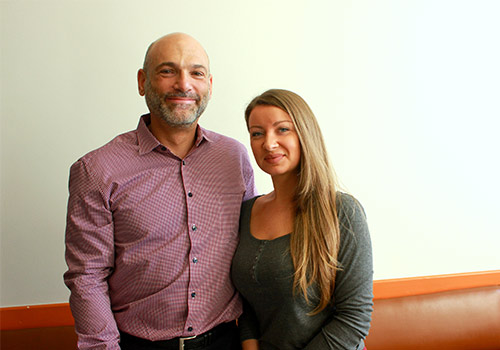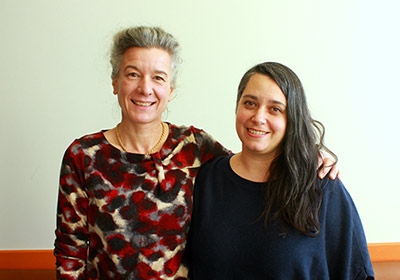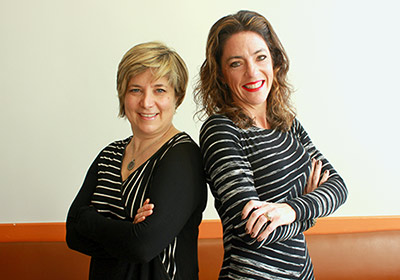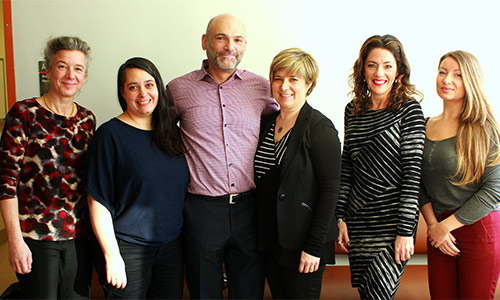By Gilda Salomone, McGill University Health Centre
Since it opened in 1999, the award-winning McGill University Sexual Identity Centre (MUSIC) of the McGill University Health Centre (MUHC) is the only psychiatric clinic in Quebec that offers a wide

Marsha Kagan, secretary “It’s important that patients don’t feel judged when they come here, we have to be open minded and accepting of diversity. My role is to greet patients in a friendly way – whether it’s in person or on the phone – and to keep their information confidential.” (Photo: Patricia Vazquez, MUHC)
range of specialized psychotherapy services tailored to lesbians, gays, bisexuals, trans and queer people —those who don’t define themselves with heterosexuality or any of the previous categories. This population, also known by the acronym LGBTQ, contacts the clinic to get help dealing with sexual identity issues and the mental suffering caused by discrimination.
A trusting relationship is at the heart of any successful psychotherapy treatment, says Dr. Montoro, so it’s important that all members of the clinic – nurse, secretary, counsellors and interns – strive to create an environment where patients feel safe to be who they are.
“Members of the LGBTQ population face particular challenges that make it more difficult to establish trusting relationships, including with healthcare providers,” explains Psychiatrist Dr. Karine Igartua, co-director of the clinic. If you are black or Jewish, chances are, so is your family. Because your parents belong to the same minority, they will have experience dealing with prejudice and can teach you how to fight off anti-Semitism or racism. But for LGBTQ people, it’s more complicated. Most parents are heterosexual and have not had to deal with homophobia; they may even have homophobic attitudes themselves, so home isn’t necessarily a safe place to be.”
Since family support is so crucial to the mental health of sexual minorities, the clinic also offers support to parents and spouses who have difficulties adjusting to their loved ones’ new sexual orientation or gender identity.
Exploding the gender binary
Throughout the years, MUSIC’s clientele has changed, following the evolution of western society, explains Dr. Igartua. “Fifteen years ago we used to treat patients who were having trouble coming out as gay or lesbian. Nowadays, social acceptance of gays and lesbians has made it easier for the average Quebecer to come out and therefore not to need psychotherapeutic support during the process. We now see a different clientele: immigrants and refugees from diverse cultures and religious faiths where the taboo around diverse forms of sexuality is still very strong. We also see more young people questioning the concept of gender entirely. Some are transitioning from male to female or vice-versa, and others don’t recognize themselves in either sex. Some people are gender creative and blast gender norms. Patients may come in with a purposeful mix of male and female characteristics. This a very new field and there are still so many unknowns. To be able to help patients achieve a happy sense of their gender is challenging, exciting and rewarding!”
Drs. Igartua and Montoro would like to expand clinical services by establishing more formal collaborations with other services and institutions, and with the addition of a psychologist, which would allow the clinic to offer more psychotherapy groups. Moreover, they hope to see the clinic continue to evolve as an academic centre, conducting research, drawing expertise from different specialties and training other professionals.
“We’re physicians, so our primary goal is to treat people who are ill,” says Dr. Montoro. “However, we work towards the ultimate goal of helping society be more equitable with the LGBTQ population.”

Laura Copeland, intern, Counselling Psychology “As a Ph.D. student in Counselling Psychology at McGill University, my research focuses on gender creative children and their families. I am able to use my understanding of current research in this area to inform my work with clients. Moreover, the open climate at MUSIC supports the sharing of knowledge and skills amongst our interdisciplinary team that positively impacts patient care.” (Photo: Patricia Vazquez, MUHC)

Vicky Rochon, nurse clinician “Being the first human contact for our clinic, I cannot overemphasize the importance of a non-judgmental and calming approach to help our patients – who tend to be quite anxious about accessing medical and psychiatric care – to feel as much at ease as possible. I am sometimes the first person they have ever talked to about their sexuality. In addition to gathering information about their situation over the phone, my role is to make them feel secure enough to be able to take the next step and consult in person. I also very much enjoy working on assisting the families, especially of our transgender teenagers, to cope as well as possible with their own challenges.” (Photo: Patricia Vazquez, MUHC)
An award-winning clinic
This past weekend, Drs. Igartua and Montoro received the May Cohen Equity, Diversity, and Gender Award from the Association of Faculties of Medicine of Canada (AFMC), in recognition for the

outstanding achievement of MUSIC in improving the gender equity environment in academic medicine in Canada.
“This award is a wonderful recognition,” says Dr. Igartua. “It shows that the clinic is valid and important not only for patients and families, but also for students and residents. We have contributed to making gender equity and diversity more acceptable within our department.”
This isn’t the first time the clinic’s relevance and expertise has been recognized. Drs. Igartua and Montoro received the Innovation of the year 1999 Award from the Association des médecins psychiatres du Québec (AMPQ), and in 2006, the Alliance for the Mentally Ill (AMI-Quebec) awarded both doctors the Exemplary Psychiatrist Award for their outstanding clinical work.
Related coverage
TVA | Une thérapie qui fait des ravages selon des experts
April 20, 2016
